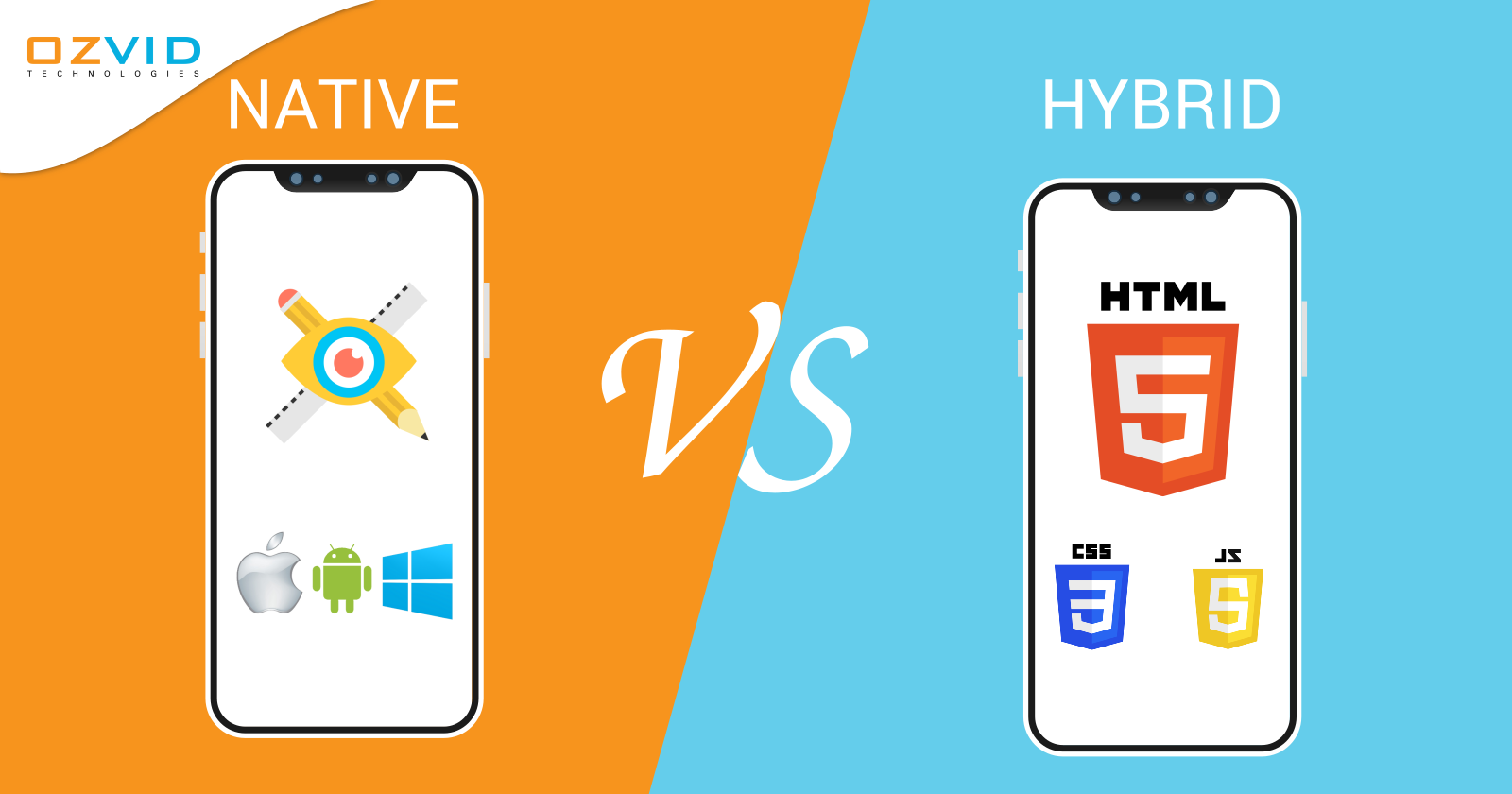- Mar 25, 2022
- Mobile App Development
- 20614
Share this post on:

With mobile devices turning into the primary choice to be used for online shopping, eCommerce store owners are thinking to their wits' end to locate the right app. Picking the correct sort of application implies careful research, knowing the sort of functionality one needs and how they need their end clients to access these apps. Creating a mobile application for your online marketplace is one of the best decisions.
The next step is to pick what kind of application you should go for; Native or Hybrid. Before we talk about these two app kinds in detail, let’s take a quick glance at them:

Native Apps
If we ask you to think about an app on your phone, there are high possibilities that the initial ones that strike a chord are native applications. Native applications reside on the mobile phone owner's device. In technical yet simple words, native applications are compatible with a particular operating system. An application developed for iOS won't be compatible with an Android device, and in this manner won't appear on Google Play, and vice-versa.
For the technically inclined store owners, iOS applications are developed using Swift or Objective-C while Android applications utilize Java. As far as development tools are concerned, coding for iOS mobiles is done on Xcode, and Android apps are built on Android Studio.
Benefits of Native Apps
The essential explanation for the vast majority of the applications being native is the heap of advantages they bring to the table:
-
Native applications are installed directly on a mobile device, and accordingly have direct access to camera, compass, microphone, swipe gestures and accelerometer. Native applications offer better functionality as compared to other sorts of applications.
-
Native applications accompany an additional advantage of push notifications. A mobile user does not have to keep the application active all the time. At whatever point, user action is required, the native application sends a push notification.
-
You won't have to compromise UI/UX compatibility of all platforms while building up a native application. Since you are focusing on one platform, you can make your application as UI/UX oriented as the platform supports.
-
Since their header files are already loaded in the OS, native applications are quick, reliable and responsive.
Shortcomings
Native applications are incredible, but then a long way from perfect, as nearly everything else in this world. It's an ideal opportunity to look at some important limitations of native apps.
-
Going for the native application implies the online marketplace owner should make an application for each platform separately. Since every OS platform runs a different code, you will require the same number of codebases as the number of platforms you need to target.
-
Since you will have to make diverse native applications for different mobile OS platforms, it takes more than one development team to complete the task. This results in greater investment in terms of time and cash.
-
Making local applications costs more than hybrid applications.
Hybrid Apps
Hybrid applications are an amalgam of native and web applications. Despite the fact that a hybrid application gets installed like a native application, it is actually a web application underneath. Much the same as their online partners, hybrid applications are also built using HTML, JavaScript, and CSS. One more thing, hybrid applications run in a simplified browser called Webview. The basic purpose of a hybrid app is unique in relation to that of a native application.
Hybrid applications can be called an experimental gig for eCommerce marketplace owners who are not yet sure whether their intended audience will like their application or not. Without contributing a considerable measure of cash and time, eCommerce store owners can get a simple version of their application developed in the hybrid app. Business owners will have the ability to have a rough idea of their application's prevalence and how the application interface is received by the masses.
They would then be able to develop a full-fledged native, likewise.
Benefits of Hybrid Apps
Since hybrid applications are built for multiple platforms. The base code continues as before, and installation simply needs a little bit of tweaking to be installed on all platforms. How about we investigate key advantages of hybrid applications:
-
Technological solutions have empowered hybrid applications to get to phone features, allowing a close functionality of the same.
-
Your costs and time to make a hybrid application will be not as much as what you would require for native applications.
-
Dissimilar to native applications, you can scale a hybrid application for any operating system.
-
As a result of a single codebase, hybrid applications are easy to manage and implement.
Shortcomings
While hybrid applications solve a great deal of purpose for an online marketplace owner, there are certain impediments to them. Let’s know what they are.
-
Native application users are constant of working with applications that are solely designed for their preferred OS. PLeasing all camps (iOS, Android, Windows Mobile) is not remotely near simple. Some application owners attempt a tad too hard on bringing a nearly customized feel to the applications. This is where the development cost may come at par with creating two native applications.
-
Hybrid applications do not offer high performance the way native applications do. The primary reason for this is the utilization of Webview. Webview may come real close to native applications, yet it can not convey the customized performance improving features that native applications have.
-
Making an application that works the same on various platforms is an extreme assignment. Hybrid applications are cross-platform in nature, and consequently, require a ton of work.
What is preferred for eCommerce Marketplace Owners?
Focus on your budget, the result you need from your application, and how sure you are about its popularity and mass acceptance. Hybrid applications are stunning when you do not have the foggiest idea about the destiny of your application, or do not know how your last application should resemble. It is additionally a smart thought for eCommerce marketplace owners who are on a tight budget and need a mobile. Native applications offer high-level functionality and great user experience.
They additionally perform superior to hybrid mobile apps. We suggest going for a hybrid application only in the event that you are short on budget or do not know how your application will be liked by your audience. Developing a hybrid mobile application costs and takes relatively the same, as that of native applications nowadays, on account of extreme customization.










